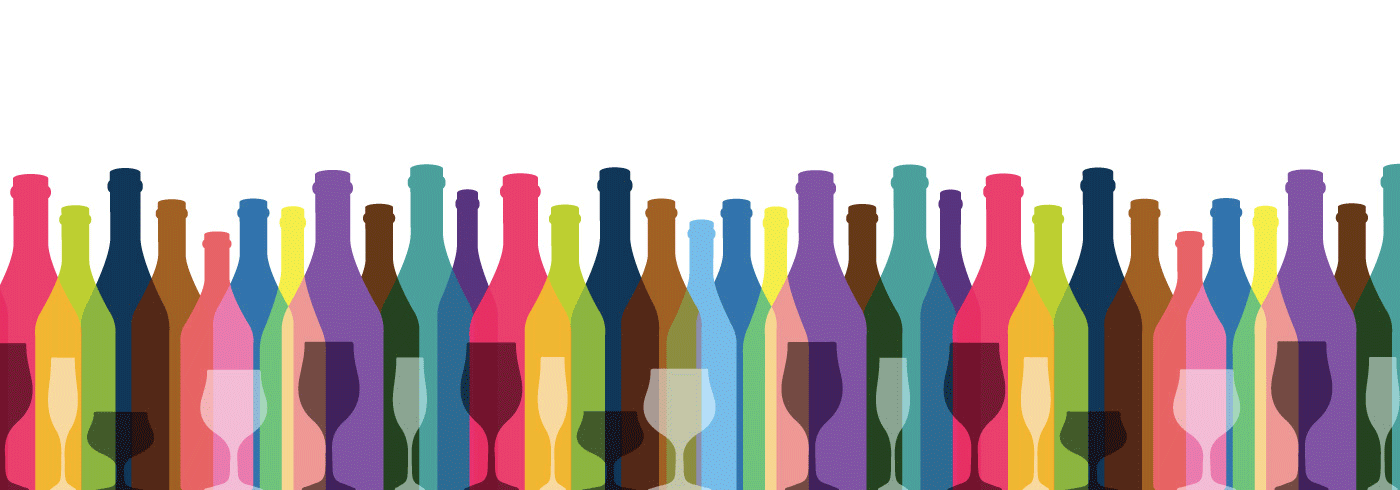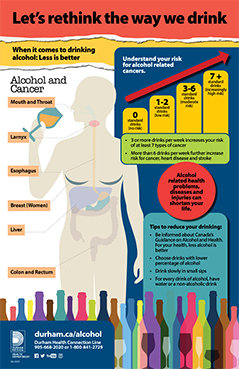Trending now
Quick tips to reduce your risk
| When there are bars and/or alcohol stores close together in an area, there are more: | People drink more alcohol when there are: |
|---|---|
|
|
|
|
Alcohol and your health
Drinking alcohol has many health risks. They can become worse if you drink alcohol frequently.
Risks include at least seven different types of cancer:
- Mouth and throat cancer
- Larynx cancer
- Esophageal cancer
- Breast cancer (women)
- Liver cancer
- Colon and rectum cancer
Other risks include:
- Heart disease
- High blood pressure
- Stroke
|
Canada’s Guidance on Alcohol and Health
Canada’s Guidance on Alcohol and Health Reduce your risk of alcohol related health problems Even in small quantities, alcohol can be harmful to your health.
|
||||
| What is a standard drink? | ||||
|
||||
| Binge drinking and risk | ||||
|
Binge drinking, usually defined as consuming five standard drinks or more for men, or four standard drinks or more for women in one setting, is a pattern of consumption that results in legal impairment for most people. The risk of negative outcomes begins to increase with any consumption, and with more than two standard drinks, most individuals will have an increased risk of injuries or other problems. On any drinking occasion, the risk of acute outcomes such as unintentional injuries and violence is strongly associated with consuming larger amounts of alcohol and a reduced ability to think clearly or perform certain activities (e.g., is caused by alcohol impairment). Risk of death It is a well-established risk factor for death from any cause, including unintentional injuries, violence, heart disease and high blood pressure, inflammation of the gastrointestinal system, and the development of an alcohol use disorder (e.g., alcohol dependence). Violence, child abuse and neglect Many of the complications arising from acute impairment and binge drinking involve second-hand effects that affect someone other than the person who drinks alcohol (e.g., violence, child abuse and neglect). |
||||
| Gender and risk | ||||
|
The Canadian Center for Substance Use and Addiction (CCSA, 2022) has reported that:
Men are more likely to:
|
||||
|
Alcohol and pregnancy |
||||
|
It is safest not to drink while pregnant or trying to get pregnant. For women who are breastfeeding, it is safest not to use alcohol. Reproductive health is compromised by alcohol use.
Drinking alcohol when you are pregnant or breastfeeding may harm your baby. No amount of alcohol is safe during pregnancy. Visit our Pregnancy page to learn more about alcohol and pregnancy. |
||||
|
Alcohol and youth |
||||
Alcohol use among Durham Region students Grades 9-12
|
||||
| Alcohol use and aging | ||||
| Rethink how you drink: Alcohol and aging | ||||
| Get help | ||||
Curriculum support for educators
Educators play an important role in the health of school communities.
Visit our Educators page for alcohol-related curriculum support resources to assist you in teaching the health curriculum and promoting health and well-being in your school.
For municipal and community planners
|
What is a municipal alcohol policy? |
|
A municipal alcohol policy aims to protect the community's health. Municipal alcohol policies address activities and factors that contribute to alcohol-related issues. |
|
How do municipal alcohol policies work? |
|
Municipal alcohol policies must use different strategies to work well. Municipal alcohol policies should include these six key policy components:
|
|
How to create a municipal alcohol policy |
|
Public Health Ontario provides Eight Steps for Creating a Municipal Alcohol Policy. |
|
Resources for municipal alcohol policy |
|
Alcohol Policy Review: Opportunities for Ontario Municipalities
|
Contact Us






